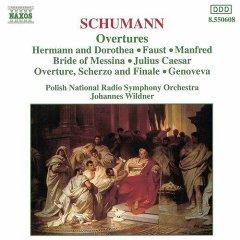Schumann – Overtures (1993)
Schumann – Overtures (1993)

1. Overture, Scherzo and Finale, Op. 52 00:17:21 2. Genoveva, Op. 81 00:08:13 3. Bride of Messina, Op. 100 00:08:09 4. Julius Caesar, Op. 128 00:09:37 5. Hermann and Dorothea, Op. 136 00:08:24 6. Faust 00:08:57 7. Manfred, Op. 115 00:10:49 Polish National Radio Symphony Orchestra Johannes Wildner - conductor
It was a nice idea to include most of the pieces of music by Schumann that have "overture" in their name. Missing is a choral overture on the Rheinweinlied, but otherwise, this CD covers the topic. However, the performances and recording leave something to be desired. The best performances here--of the little-known "Bride of Messina" and "Hermann und Dorothea"--are maybe fueled by the element of discovery. The tempos seem judiciously handled, and Johannes Wildner does everything he can to get the lumbering, four-square rhythm of the "Bride" to move. Not much he can do about those squeals from the piccolo, though--Schumann for some reason wrote them into the score thinking, I guess, that they added an element of doom and terror to the "curse" motif that dominates the overture. No such problem with the more successful "Hermann und Dorothea," an atmospheric little piece with (as far as I know) Schumann's one concession to the extra color that a snare drum could add to his often opaque scoring.
The other performances, unfortunately, suffer from a variety of ails, including a very much off-pitch clarinet in the lovely second melody of the "Faust" Overture (plus uncalled for dissonances from the brass at the start of the coda--let's tune it, gentlemen!); a lumbering gait to the opening of the "Julius Caesar" Overture (one of Schumann's least inspired works, it must be said); a labored trio section in the Scherzo of the "Overture, Scherzo, and Finale" (though this is a pretty good performance for the most part); a strange pause (a bad edit?) before the final dash in the coda of the "Genoveva" Overture (one of Schumann's real triumphs); and a bit of slap-dash in the faster passages of "Manfred" despite a general trend toward sclerotic rhythms (though this fine overture is hard to kill and emerges mostly unscathed in a decent performance overall).
The recording has good stereo spread and depth and a definite sense of the concert hall but is a tad too distant for the kind of definition that Schumann's thick scoring cries out for. So if you want this music--some of it obscure but worth hearing--the current CD is an OK way to acquire it, but we could have hoped for more than that. --- M. C. Passarella, amazon.com
download: uploaded yandex 4shared mediafire solidfiles mega zalivalka cloud.mail.ru filecloudio anonfiles oboom








